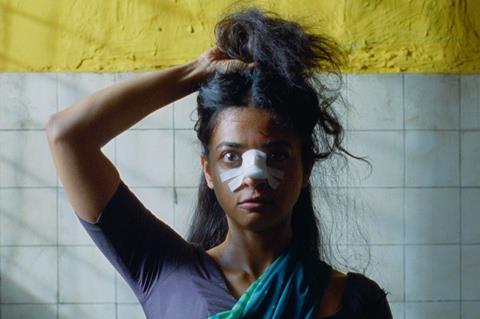
This year’s Cannes Film Festival was a watershed moment for Indian cinema as Payal Kapadia’s All We Imagine As Light won the Grand Prix as the first Indian film in Competition for 30 years. It was also a defining moment for UK-India coproductions, with not one, but two, playing in the festival’s official selection.
Those films, Sandhya Suri’s Santosh and Karan Kandhari’s Sister Midnight, are some of the first fruits harvested from India’s filming incentive for incoming productions, which was launched in 2022 and then boosted in 2023 from 30% to 40% of qualifying expenditure and from a cap of $300,000 to $3.6m (with an additional 5% rebate bonus for significant Indian content).
As the 18th edition of NFDC Film Bazaar in Goa (November 20-24) gets underway, there is a genuine enthusiasm in the UK and Indian industries about the growing potential for collaboration.
“With the large Indian diaspora in the UK, there has always been a strong mutual interest in fostering collaboration between the two countries. The Indian incentive enables Indian producers to contribute to financing, which has significantly increased opportunities for Indian stories to have international collaborators,” explains Alan McAlex, who was the Indian producer on both Sister Midnight and Santosh through his Mumbai-based company Suitable Pictures, and who is currently working on his yet unnamed third project with UK producers. (He’s also pitching a different new film, Aadu Ki Kasam, at Film Bazaar this week.)
Sister Midnight was the first UK production (and fifth globally) to apply for and receive the Indian production incentive, with UK producers Alastair Clark for Wellington Films and Anna Griffin for Griffin Pictures teaming up with McAlex for the Mumbai shoot.
“At the time no UK lender would lend against [the incentive] because it had never been used before. But we have proved that it works and pays up and UK producers can now look to put it in their budget,” says Clark, who says he was hugely impressed by the film’s local crew in India. “The dedication and resourcefulness of the crew was amazing. Nothing ever seemed too much, they would always find a way. To shoot the equivalent film in the UK would have been significantly more expensive.”
Despite a UK-India coproduction treaty being in place since 2008, neither Sister Midnight nor Santosh were official co-productions. Both films were able to access the UK’s film tax credit via the cultural test and the Indian incentive, by merit of being “incoming productions”. The BFI Filmmaking Fund also backed both productions.
In fact, to date, there have been no completed official co-productions, although there are currently several films that are on their way to becoming official, having received “interim certification”. One of these is Kajri Babbar’s historical drama Lionness, which was announced at last year’s Film Bazaar and is still in the financing stage.
“At some point co-productions will come out that are comfortably fitting the model, but before we get there this artisan approach is working. The more we work together, the more comfortable we will be to use the treaty, just like in Europe,” explains the BFI’s head of international relations Agnieszka Moody, who also points to the potential for co-productions to access the UK Global Screen Fund, where the UK producer applies as a minority co-producing partner.
The BFI took a delegation of UK producers to Film Bazaar in 2023 with a view to fostering relationships with Indian partners, and Moody continues to see a “real will and effort to make co-productions work on India’s side.” Moody will talk to this year’s Film Bazaar Producers’ Network delegates about working with the UK.
“India are doing their bit to incentivise their producers and I can see that there is a burgeoning independent sector, with producers who are absolutely focused on the international space,” she adds.
Budgets
Still, for Indian producers looking to shoot part of their projects in the UK, the biggest challenge is likely to be budgetary considerations.
“There is an imbalance in costs of production [comparing India and the UK] and a less experienced producer might not realise that the cost of shooting two days in the UK will elevate the budget in a significant way. It’s all perfectly possible to make it work, but you have to go in with an open mind,” adds Moody.
One high-profile filmmaker with an official UK/India coproduction in the pipeline is UK-based, Canada-born Richie Mehta, whose previous work includes features Amal and Siddharth and Emmy-winning drama series Delhi Crime, which Mehta created, wrote and directed before selling it to Netflix.
“I’m working on a big series co-pro between the two countries and I’m trying to marshal resources on both sides. There is incredible goodwill and willingness across both the Indian and UK industries to make this happen, I find, as long as the material merits it.” Mehta will deliver a fireside talk to Film Bazaar’s Producers’ Workshop this week.
When it comes to co-productions, finding the right material that works creatively as opposed to teaming up just for financial reasons is key.
“We need to start thinking about stories. Our history is interlinked. We speak the same language, there is a sizeable Indian community here,” says UK producer Neeraj Churi of Lotus Visual Production, whose next feature The Song Of Flowers is one of 21 projects selected for Film Bazaar’s co-production market.
Co-written and directed by Shubhum Negi and Sourav Yadav, the film will centre around a polyandrous family living in the Himalayas whose livelihood is threatened by climate change. Churi’s previous feature, A Place Of Our Own (set in Bhopal, India), won the 2023 Global audience award at SXSW.
Adds Churi: “There is a lot going for us, but we need to think about how we can blend it all together. That is when we will start tapping into the real potential.”

























No comments yet